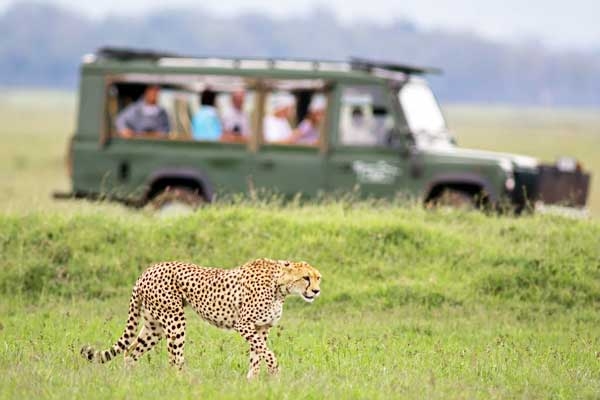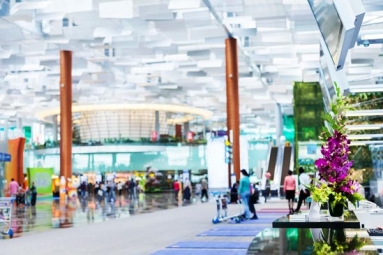
(Image source from: Canva.com)
Enveloped in blankets, you find yourself in an open 4x4 as the early morning sky transitions to shades of orange, and a line of giraffes gracefully walks by. If this doesn't epitomize a unique take on early-morning tea, what does? A safari in South Africa guarantees breathtaking wildlife, striking landscapes, and memories that will last a lifetime. However, navigating rugged terrain and seasonal variations necessitates careful planning. Whether your goal is to encounter the Big Five - lion, elephant, leopard, rhino, and buffalo - in Kruger National Park or to unwind in a luxurious lodge, this comprehensive guide will equip you with essential tips for an amazing South African safari experience. Here are some practical and straightforward suggestions for organizing the perfect safari:
Select the Right Season: In South Africa, safari seasons are influenced more by rainfall patterns than by temperature fluctuations. The dry winter months from May to September are the best time for wildlife viewing, particularly in parks such as Kruger and Madikwe. During this period, the vegetation is sparse and water sources are more consistent, making it easier to spot animals. If photography is your passion, this timeframe also provides clearer skies and a gorgeous golden light. Conversely, summer (November to March) brings lush greenery and humidity, which is great for observing birds, young animals, and more affordable rates, but be prepared for dense vegetation and occasional afternoon thunderstorms. For those new to the safari experience hoping to see the Big Five, aim for the months of June to August. If you prefer a quieter adventure on a budget, the shoulder seasons of May and early October can be ideal.
Determine Your Desired Level of Comfort: A South African safari can vary significantly in cost. Your financial plan will influence whether you camp beneath the stars or relax with a glass of wine at a luxurious lodge complete with a plunge pool. It's advisable to first decide on your preferred level of comfort and luxury to choose suitable accommodations. Many upscale options offer gourmet dining, personal butlers, private guides, and even spa services. Although pricier, lodges in private reserves typically include multiple daily game drives, meals, and transportation. For those on a budget, the rest camps found in Kruger provide basic chalets, campsites, and braai areas. While you'll need to drive yourself and prepare your meals, your expenses will remain low.
Choose the Experience That Fits Your Preferences: South Africa has a variety of national parks and private reserves, each offering distinct experiences. Spanning the size of a small nation, Kruger National Park accommodates self-drive options with reasonable pricing and numerous public camps. If you're comfortable driving and desire flexibility, this is an excellent choice for a DIY adventure. On the other hand, private reserves such as Sabi Sand, Timbavati, or Madikwe offer guided drives, luxurious lodgings, and off-road tracking for close encounters with wildlife. Although these experiences come at a premium, they often mean fewer vehicles at sightings, closer views of rare animals like leopards, and exceptional guiding. For those worried about malaria, particularly families, parks like Pilanesberg, Madikwe, and Addo Elephant National Park provide abundant wildlife without health risks, eliminating the need for anti-malarial medications.
Pack Wisely, Not Heavily: When preparing for a safari, it's essential to blend practicality with some strategy. Early morning excursions can be quite chilly, even in winter, while midday temperatures can rise rapidly. Opt for layered clothing, which may include fleece, windbreakers, and lightweight cotton. Bright colors should be avoided; instead, choose earth tones like khaki, olive, and beige to remain discreet in the wilderness. Remember to bring a good set of binoculars (at least 8x42), sunscreen, a wide-brimmed hat, insect repellent, and comfortable closed shoes suitable for walking in the bush.
Understand Inclusions: Safari experiences can differ significantly, so it's crucial to know what amenities and activities are included in your lodge or park stay prior to your arrival. Generally, private lodges feature twice-daily game drives, guided bush walks, all meals, and sundowner activities as part of their offerings. Some may provide additional activities such as stargazing, wildlife lectures, or spa services, although these can vary. Furthermore, do not take for granted that activities like walking safaris, night drives, or conservation tours are included—verify in advance and make early reservations, particularly during peak seasons. Transport arrangements between lodges and parks can also be ambiguous; some places offer free transfers from nearby airstrips or cities, while others might not, so always double-check the logistics when booking.
Value Your Guide: In private reserves, the expertise of your guide and tracking team can significantly enhance your safari experience. A skilled guide excels not only at spotting wildlife but also in interpreting animal behavior, tracking footprints, and sharing knowledge that enhances your visit. Seek out lodges that feature FGASA-certified guides (from the Field Guides Association of Southern Africa). If you are making independent arrangements, look for up-to-date reviews focusing on the guide's knowledge, passion, and respect for wildlife. In public parks, unless you arrange for guided game drives through SANParks, you'll depend on your own spotting abilities. While guided drives are budget-friendly and can provide good opportunities for sightings, they may not deliver the same level of access or tracking expertise as a private reserve.
Extend Your Journey: South Africa's vibrant landscape offers so much more than just a bush experience. Many travelers choose to combine their safari with a visit to Cape Town or the Garden Route, where they can explore wine regions, beautiful beaches, and stunning mountains. Cape Town is particularly enjoyable from November to March, coinciding with the safari's low season and the Cape’s summer—making it easy to merge both experiences. If departing from Johannesburg, consider visiting the Panorama Route or the Blyde River Canyon for breathtaking views before or after your safari. Internal flights are economical and dependable, allowing savvy travelers to enjoy the best of both worlds with two adventures in one trip.







